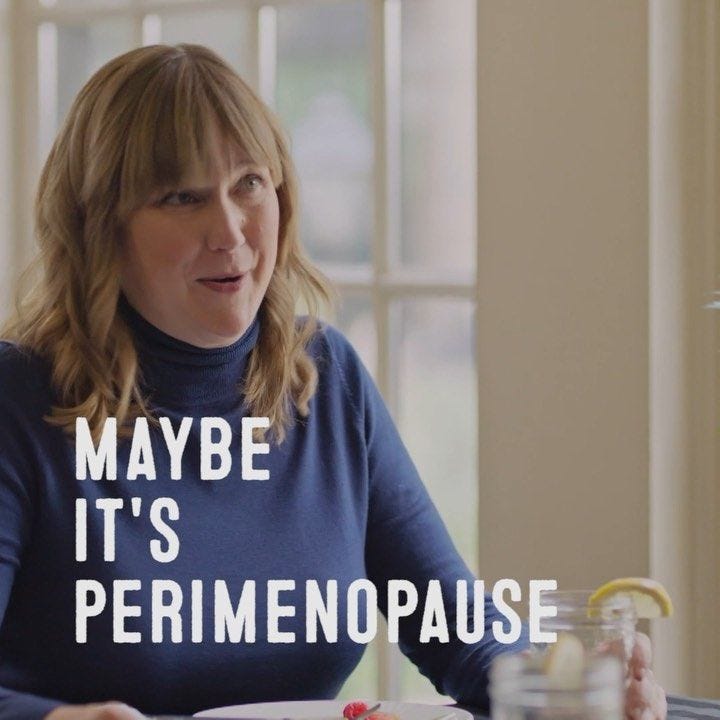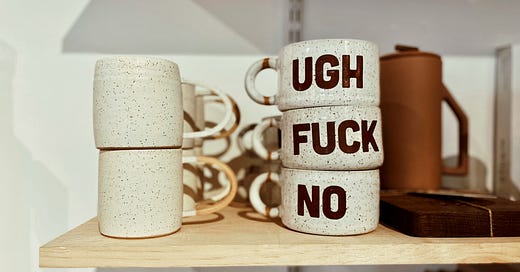I lie in bed with my senses all awake.
I listen to my partner breathing beside me. I am filled with irritation by every toss and turn. I wonder when my body will allow me to slip into deep rest.
My 43-year-old body appears unaware that it is dark outside. Perhaps it may be good to sleep at night.
I am perimenopausal. I think. Actually, some days I am not even sure if I am perimenopausal, until those sleepless nights and other symptoms arise.
It’s like the Baroness von Sketch show, Perimenopause.

Is this perimenopause?
You think?
I don’t know. Is it?
No. Nooooo. Maybe?
Fuck.
My body is changing around my hips, chest and waist. I’m genderfluid, and some of these changes have kicked up my gender dysphoria. Mood swings occur about 50 times per day. Then there’s the sleep issues. A few other strange symptoms arise now and again, like a metallic taste in my mouth.
This stage of life has me reflecting on perimenopausal symptoms and how I get pulled into messages around what I should do to heal my body. What should I be eating? How should I be exercising and moving my body? Are the symptoms I’m having because I am doing something wrong?
There are people, and friends of mine, that really care about offering information about perimenopausal health that can help people suffer less. I’ve taken some of the advice. I have increased my protein and tweaked the kinds of food I eat. I am considering progesterone for my sleep issues and have changed my exercise routines.
But-and-also, it all sounds very familiar.
The wellness industry and healthism have fed us the idea that health is always attainable. They tell us that being healthy is up to the individual. It’s all about you, and your diet and exercise choices, lowering stress levels, “balanced hormones” and whatever the latest health trend is. Do my workout routine. Buy my product. Buy my service. I’ll get you back to a “ younger and healthier body”.
As a person who’s lived periods of my life since I was nine years old with chronic pain, migraines, depression, TMJ pain syndrome, ulcer and other stomach issues, fatigue, and pain screaming from every one of my tissues, there is no “healthy body” for me to return to. There is no healthy past person I can measure myself against. Only the ideas sold to me from the billion dollar health and wellness industry.
The lack of care in this world is tremendously painful. Healing pain is a cyclical, frustrating, and an exhausting journey. For me, attempting to reach a goal of health is a trap. An expensive trap.
With the misfortune and fortitude of being a Sensitive being, I am unable to ignore how we are interconnected and interdependent. My body is perceptive. The sickness reflex can come up due to relational issues or work matters, or a change in my environment. I don’t see this as anything wrong with me. Pain keeps me honest and authentic with myself and those I’m in relationship with. It helps me be in integrity. It also sucks to be sick and Sensitive in a highly insensitive world!
There are external circumstances that create conditions for pain such as racism, homophobia, transphobia, sexism and ableism. Unfortunately, with rising fascism and billionaires making this earth more uninhabitable, the conditions we are living in are likely going to get more dire. And our bodies are going to feel this.
The other day my friend, Danielle and I were having a dialogue about the word “unruly”. We are preparing to co-teach a workshop together on the Perimenopause and this mid-life stage. The word “unruly” came up, and I was at first uncertain about using this word.
When I google the word “unruly”, the dictionary definition is,
“Disorderly and disruptive and not amenable to discipline or control.”
I had some trepidation that “unruly” may be taken as our bodies are doing something that they shouldn’t be. I interpret some of the messages offering perimenopausal support to have this as an underlying theme in their message as your body is wrong. Your body’s hormones are “imbalanced”. Your body is gaining belly fat and this is wrong. Come to me to help you.
But then Danielle offered me how she saw the word unruly and wisely wrote to me,
“I want my body to be disruptive, at the very least to narratives about how it ‘should’ behave”.
Our bodies are unruly. Not that they are “wrong”, but they are uncontrollable and beyond discipline or fixing. Perhaps rather than getting rid of symptoms, we need to focus on befriending our bodies, and invite the disruption that arises.
What are we disrupting? How can we disrupt societal norms about how we should behave and express our bodies?
Our sick bodies are being disruptive to Capitalism. Capitalism needs us to work. It needs to use our bodies for labor. I am only able to work part-time. There have been times in my life when I couldn’t work at all. How can we approach our perimenopause bodies as disruptive to Patriarchal and Capitalist systems?
Furthermore, “how to get rid of your belly fat” sounds steeped in fat phobia, and a belief that we should all have flat, toned bellies. If we don’t we must just be not working out hard enough, not eating well enough, not being… enough.
Um… no. Bodies are hard, thin, fat, toned, soft, and dimply. We age. We have saggy bits. But not if I buy your product, eh? The health and wellness industry is drenched in ableism, and images of white, thin, muscular, cis and able-bodied people selling me an image to sell their stuff.
The magnificent disability activist and writer, Eddie Ndpou, spoke in a conversation with the equally marvelous artist, poet and gender non-conforming activist, Alok.
In their conversation, Eddie spoke of the liminal spaces of living with disability and says,
“Through ableism, the world sees us as a failure… Embodied experience of disability is the closest thing to being a human being. I live alongside and with/through illness on a daily basis. My vantage point is so rich - I simultaneously hold vitality/morality and illness/wellness. I think outside the realm of these binaries. People do not understand the spiritual capacity it takes to live in a disabled body.”
I wept when I heard Eddie speak these words as they felt so true to my experience of survival when I was a youth and so horribly sick.
We are always somewhere in between health and illness, aliveness and dying. I am not going to attain and maintain health. Healing, for me, is about building a greater spiritual capacity to live in a body. I moved beyond wellness industry notions of attaining a healthy self a long time ago.
Not to say I don’t try to alleviate symptoms. I do. Every. Single. Day. I deeply love my body, down through my skin, tissues and bones. My body is my friend and companion. I want to ease pain and increase joy and pleasure.
Now in perimenopause, messages stream into my phone about ways to “get better”. But I know better. When I have gotten stuck in the past is when I am trying to heal. When I take the journey past trying to heal, that’s, ironically, when I feel better. And for some of us, we never get better, but we do find ease one way or another.
I will not try to get past perimenopausal symptoms. There is something beyond “fixing” my mid-life body. Maybe it’s acceptance and self-love. Maybe it’s being sensitive and intuitive. A queer weirdo. A shit disturber, who isn’t interested in being someone else’s version of what the correct perimenopausal body should look like.
Watching my body change and having *fun* new symptoms arise like sleepless nights are much less extreme than what I’ve been through. But change is scary and so is walking with all the unknowns of how my mid-life body will develop and unfold.
There is a lot of information I could ingest about how to help my body as I go into perimenopause. Some of this I’ll take in, and some of it I’ll keep on the back table. But I will not pathologize myself. I will not attempt to get back to a youthful body.
Transformation usually comes with growing pains. I am moving into the interstitial space of being in-between and in the unknown. I am not young or maybe even close to menopause.
And I am nervous. I’ve been through a lot with this body. Yet I am grateful that I get to experience this stage of life.
This article was inspired by a course I’ll be teaching with two colleagues about the Perimenopausal life stage. Subscribe to my Substack if you want to hear more about it.
I’m choosing to close comments on my posts but I’d love to hear from you! Email me at: contact@kellygordon.ca.




